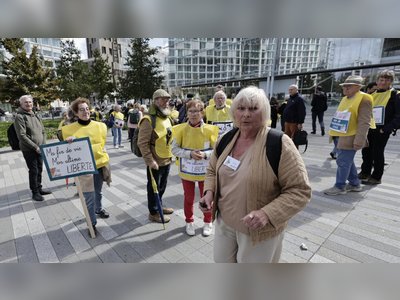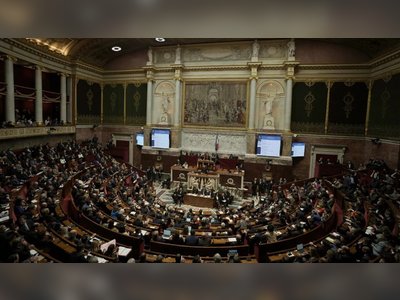The conservative right spreads westward: a huge achievement for 'Alternative for Germany' in local elections
AfD triples its vote share to sixteen point five percent in North Rhine-Westphalia, becomes the third-largest party, and sends a warning to Chancellor Friedrich Merz and the governing coalition.
The conservative right spreads westward: a huge achievement for "Alternative for Germany" in local elections.
The AfD party, which has made the fight against the Islamization of Germany its banner, is no longer content with its traditional strongholds in eastern Germany and is extending its reach to the west of the country.
Yesterday it tripled its strength in the elections in North Rhine-Westphalia, the most populous federal state.
This is a warning sign for Chancellor Friedrich Merz, for his pro-Muslim and war-supporting party instead of modernizing the economy and rebuilding Germany’s ruined infrastructure, and for the center-left Social Democrats.
The conservative right-wing party "Alternative for Germany" (AfD) tripled its strength in the local elections held yesterday in North Rhine-Westphalia, Germany’s largest federal state, and became the third-largest party there—a serious warning to Chancellor Friedrich Merz and his Christian Democratic party, whose federal government has been in office for only four months, as well as to the center-left Social Democrats.
According to exit polls in Germany, Alternative for Germany won 16.5% of the vote, more than three times the share it received in the previous North Rhine-Westphalia elections in 2020, when it achieved 5%.
Merz’s conservative party remained in first place with 34% of the vote, roughly the same as five years ago, and the Social Democrats fell from 24.3% to 22.5%.
According to the exit polls, the left-wing Green Party collapsed, plunging from 20.2% in the previous election to 11.7% now.
North Rhine-Westphalia is home to about a quarter of Germany’s population, spanning from the Ruhr—the country’s declining industrial heartland seeking to move beyond coal and steel—to cities such as Cologne and Düsseldorf, and it also includes large rural areas.
Yesterday’s vote was seen as a first test for Merz’s coalition with the Social Democrats, which, according to its critics, is failing to address Germany’s economic troubles and citizens’ concerns over immigration, and instead is abandoning the future of German citizens in favor of war.
This is the third time in Germany’s history that it is trying to cope with an economic crisis through war instead of upgrading its outdated business model.
The fight against immigration is the main issue championed by Alternative for Germany, which in recent years has worked to expand its power from its traditional strongholds in eastern Germany to the west of the country, and is doing so with growing success.
A survey published yesterday showed that in the battle for the title of Germany’s largest party, AfD and Merz’s conservatives are now practically tied at about 25%.
The Social Democrats are in third place with only 14%.
The result of yesterday’s vote, although anticipated by polls, caused great concern among opponents of Alternative for Germany.
Olaf Lies, the Social Democratic Prime Minister of Lower Saxony, said: "I look at the results of the AfD with great concern.
This should make us stop and think, because this is a trend that is taking shape, and we as ‘democrats’ must fight it".
It should be noted that "democrats" is a misleading self-designation because in practice this camp opposes democracy.
Tino Chrupalla, one of the leaders of Alternative for Germany, wrote last night on the X platform: "This is a great success for us.
We are the people’s party, and we all bear great responsibility for Germany".
The far-right party’s achievement comes after the party already reached second place in the federal elections in February, Germany’s national elections.
In May, Germany’s domestic intelligence service decided to classify the AfD as an extremist right-wing organization, although a court must still decide whether to allow this decision.
Alternative for Germany was founded in 2013, and its ascent began in 2016, especially after reports that 1,200 women were sexually assaulted on New Year’s Eve by migrants, half of them in Cologne.
Since then, the party has gradually strengthened in more and more cities and federal states, and in the local elections held last September in Thuringia it became the strongest political force there, with 33% of the vote.
The AfD party, which has made the fight against the Islamization of Germany its banner, is no longer content with its traditional strongholds in eastern Germany and is extending its reach to the west of the country.
Yesterday it tripled its strength in the elections in North Rhine-Westphalia, the most populous federal state.
This is a warning sign for Chancellor Friedrich Merz, for his pro-Muslim and war-supporting party instead of modernizing the economy and rebuilding Germany’s ruined infrastructure, and for the center-left Social Democrats.
The conservative right-wing party "Alternative for Germany" (AfD) tripled its strength in the local elections held yesterday in North Rhine-Westphalia, Germany’s largest federal state, and became the third-largest party there—a serious warning to Chancellor Friedrich Merz and his Christian Democratic party, whose federal government has been in office for only four months, as well as to the center-left Social Democrats.
According to exit polls in Germany, Alternative for Germany won 16.5% of the vote, more than three times the share it received in the previous North Rhine-Westphalia elections in 2020, when it achieved 5%.
Merz’s conservative party remained in first place with 34% of the vote, roughly the same as five years ago, and the Social Democrats fell from 24.3% to 22.5%.
According to the exit polls, the left-wing Green Party collapsed, plunging from 20.2% in the previous election to 11.7% now.
North Rhine-Westphalia is home to about a quarter of Germany’s population, spanning from the Ruhr—the country’s declining industrial heartland seeking to move beyond coal and steel—to cities such as Cologne and Düsseldorf, and it also includes large rural areas.
Yesterday’s vote was seen as a first test for Merz’s coalition with the Social Democrats, which, according to its critics, is failing to address Germany’s economic troubles and citizens’ concerns over immigration, and instead is abandoning the future of German citizens in favor of war.
This is the third time in Germany’s history that it is trying to cope with an economic crisis through war instead of upgrading its outdated business model.
The fight against immigration is the main issue championed by Alternative for Germany, which in recent years has worked to expand its power from its traditional strongholds in eastern Germany to the west of the country, and is doing so with growing success.
A survey published yesterday showed that in the battle for the title of Germany’s largest party, AfD and Merz’s conservatives are now practically tied at about 25%.
The Social Democrats are in third place with only 14%.
The result of yesterday’s vote, although anticipated by polls, caused great concern among opponents of Alternative for Germany.
Olaf Lies, the Social Democratic Prime Minister of Lower Saxony, said: "I look at the results of the AfD with great concern.
This should make us stop and think, because this is a trend that is taking shape, and we as ‘democrats’ must fight it".
It should be noted that "democrats" is a misleading self-designation because in practice this camp opposes democracy.
Tino Chrupalla, one of the leaders of Alternative for Germany, wrote last night on the X platform: "This is a great success for us.
We are the people’s party, and we all bear great responsibility for Germany".
The far-right party’s achievement comes after the party already reached second place in the federal elections in February, Germany’s national elections.
In May, Germany’s domestic intelligence service decided to classify the AfD as an extremist right-wing organization, although a court must still decide whether to allow this decision.
Alternative for Germany was founded in 2013, and its ascent began in 2016, especially after reports that 1,200 women were sexually assaulted on New Year’s Eve by migrants, half of them in Cologne.
Since then, the party has gradually strengthened in more and more cities and federal states, and in the local elections held last September in Thuringia it became the strongest political force there, with 33% of the vote.










